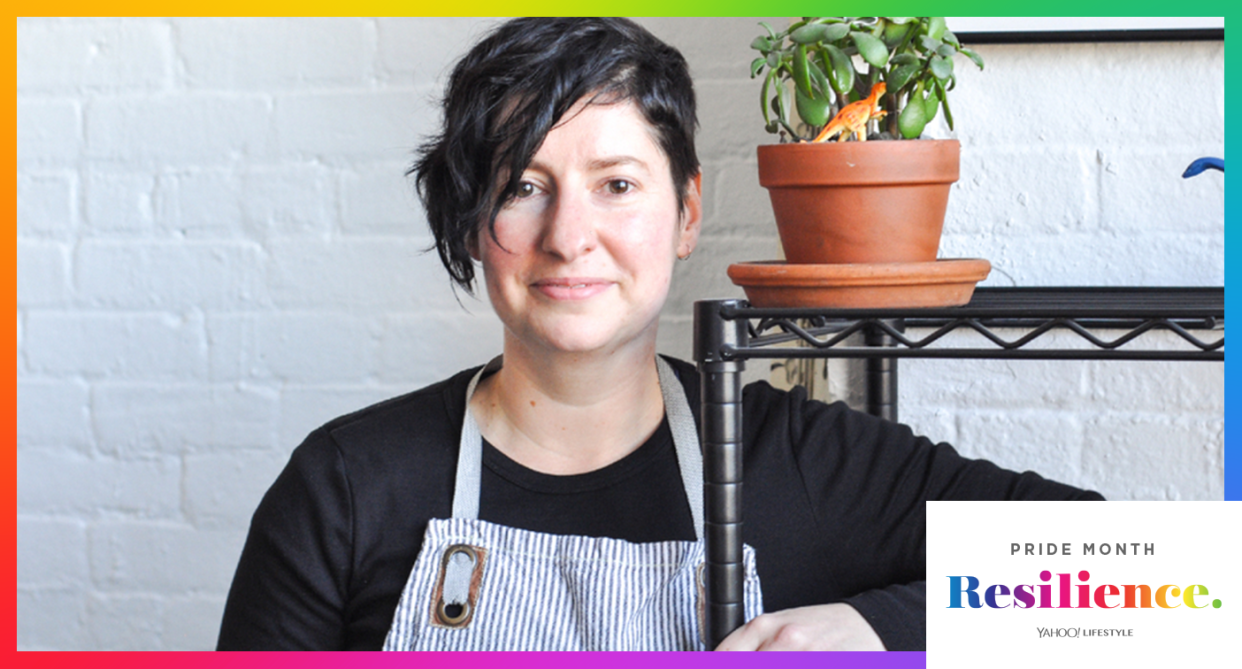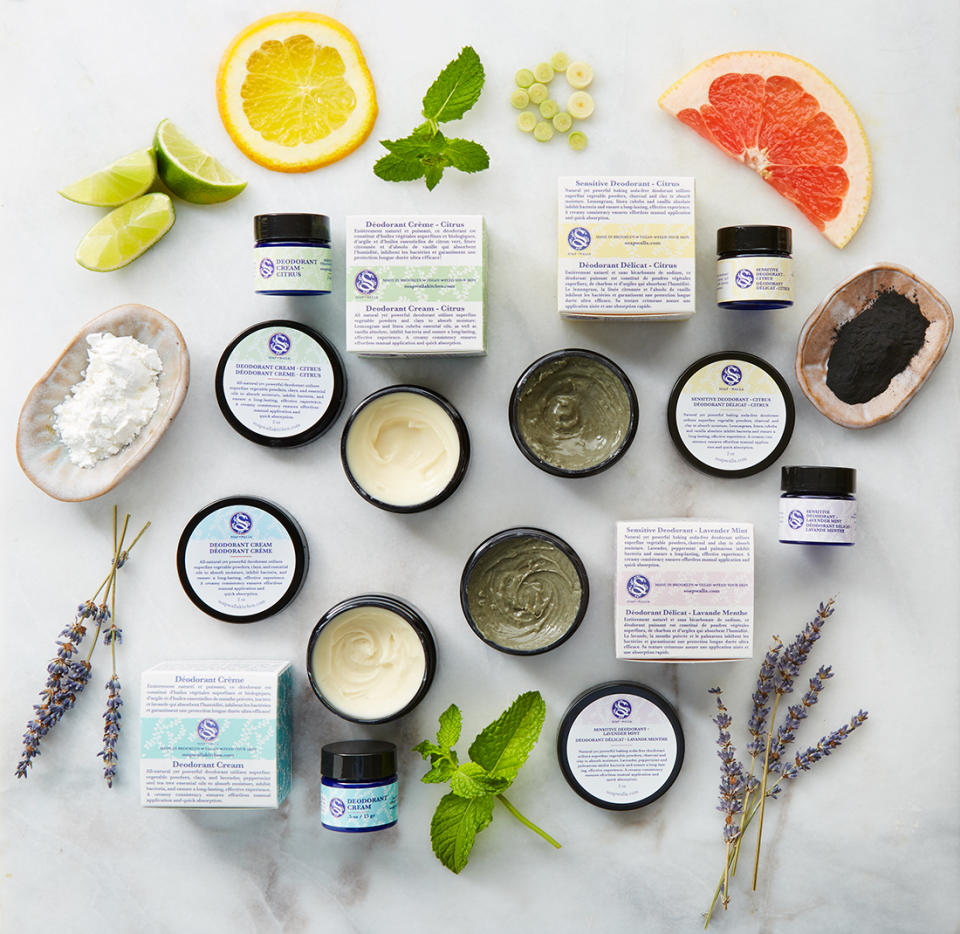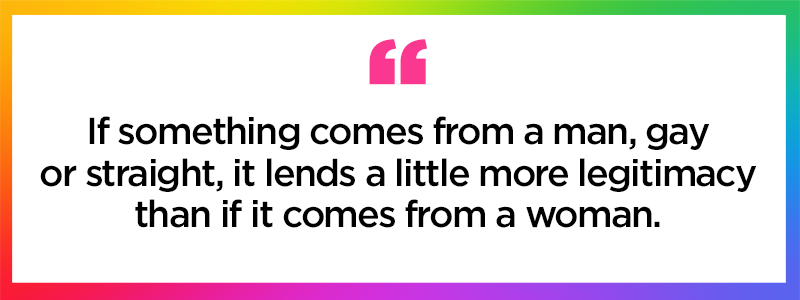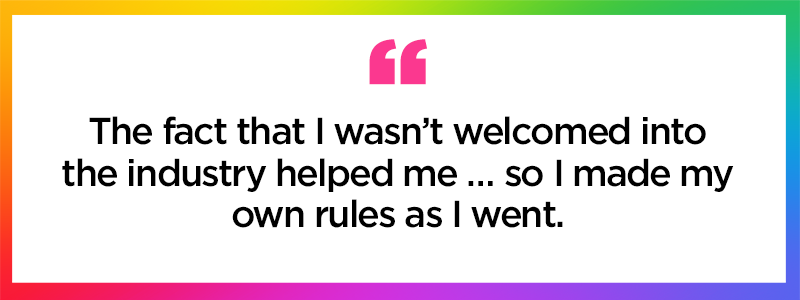Why this queer entrepreneur feels shunned by the beauty industry: 'I don't fit society's idea of pretty'

Welcome to Yahoo Lifestyle, Pride Edition, commemorating June — Pride Month — with a collection of stories celebrating the resilience of LGBTQ people, from celebs, including Adam Rippon and Karamo Brown, to trans women and men discovering their inner power through a unique beauty clinic, to queer youth receiving vital support from their gay elders after aging out of the foster system. And so, as they shout in the streets: “We’re here, we’re queer — get used to it!” Here, the founder of cult organic skincare line Soapwalla Rachel Winard opens up to writer Molly Shea about feeling shunned by the beauty industry as a queer woman.
When I was diagnosed with lupus in 2002, my doctor suggested that I switch from conventional skin care to natural, plant-based formulas. That seemed impossible — I couldn’t find anything that wouldn’t irritate my sensitive skin, sure, but the problem was bigger than that. When I went into department stores or natural beauty boutiques or even Sephora, I was very aware that I wasn’t welcome in those spaces.
I’m queer, and I don’t fit society’s idea of “pretty.” I usually joke that I look like a 12-year-old boy, but it’s true, and often means that people don’t think I belong in the beauty world.
I remember as a child, even before I knew I was queer, when my mom would take me to a department store, asking, “Can we just run through the makeup section?” I really had an aversion to it. The overwhelming scents, the hypersexualized and hyper-feminized nature of it — it just did not make me feel remotely comfortable or welcome. Once I was diagnosed with lupus and started looking for natural products in my 20s, I ran into the same problems. I avoided stores and shopped mostly online, but there’s still a culture that you can feel on a website and social media.

So I built a company from scratch, creating products in my kitchen and testing them on friends, then selling them. Now, Soapwalla products are sold in 250 retail shops around the globe — half in the U.S., half in Europe. But despite all the progress and popularity, I still don’t feel comfortable in my own industry. There are stores I’d expect to stock my products that never reach out. I’m passed over for panels or press, and generally made to feel like an outsider. It’s tough for any woman to be a business owner, but the beauty industry can be particularly harsh to its queer members.

I’ve been excluded from professional social gatherings, or sat at dinners where the entire conversation was geared toward straight women and I felt like I was invisible. Several times, there have been offhand remarks like, “Oh well, you wouldn’t understand. Wink, wink. Nudge, nudge.” Sometimes, people simply look through me like I’m invisible.
It’s easy to point to shows like Queer Eye or makeup campaigns with male models, as proof that the LGBTQ community is more widely accepted in beauty. But that same acceptance hasn’t spread to those of us who present as more masculine, like I do. I’m not the traditional idea of what “pretty” is, whereas some gay men can be what straight, female “pretty” is. I think misogyny plays a role, too. If something comes from a man, gay or straight, it lends a little more legitimacy than if it comes from a woman.
I’ve learned to point out bias when I see it. If someone is calling a group of women “girls,” I’ll say, why don’t we say “women” instead? Or “people”! If I’m talking with a retailer about our products and they start to use gendered terms, I’ll say, “Everything is unisex, and it’s unisex by choice.” Skin is skin!

I try not to put anyone on the defensive, because it doesn’t go anywhere. I get it — it sucks to learn that something you’re saying isn’t being received the way you thought it would be. But generally, people respond pretty positively. They’ll say, “Oh, I hadn’t thought about that,” and then it usually leads to change.
I can see that what I’m doing is working. I’ll get care packages and personalized notes from customers who are happy to shop from a judgment-free company. And when I sit on a panel, and the other members are very straight women with long, flowy hair and dresses, and I’m in a vest and pants and look the way I do, young, queer folks will come up and say, “Thank you for being visible” or “Thank you for looking like me.”
I get hate mail, too — mostly through Instagram DMs, Facebook, and email. People will tell me I’ll burn in hell, or call me a fag — I get called a fag more than anything, which is crazy, since that’s not even the correct hate terminology for a lesbian! The angry messages are often in response to something prideful we’ve posted on social media or if someone sees my photo. When I get hate mail — particularly if it’s homophobic — I’ll look up that person’s order history and total up the amount that they’ve spent on Soapwalla products, then donate it to the Ali Forney Center, which helps local LGBTQ youth. I don’t want their money, but I know a lot of other people could use it. I don’t hold grudges, but there’s that sweet revenge of knowing that their money is helping to get queer kids off the street.

When I tell other, more conventional-looking founders about the hate mail I get, or the way some people talk to me, they’re shocked — it’s just not their experience. And it’s frustrating when I know that I’ve been skipped over for a panel or I’m not being stocked at a trendy natural beauty store, because of how I look. But in some ways, the fact that I wasn’t welcomed into the industry helped me. Because I didn’t feel like I was a part of it, I was completely free from all the rules. So I made my own rules as I went.
We’re really careful about the language we use, for example. If you scour our website, you won’t find anything gendered on it, and that’s really purposeful. We have a pregnancy belly oil, because pregnancy is a medical condition and there are certain oils you cannot use while you’re pregnant. So we call that out because it’s safe for pregnancy, but we do not call out who gets pregnant.

I don’t use models, because I want you to envision yourself using the products. I don’t need to tell you what my ideal person to use this product looks like, because if a person has skin and they want to use our products, then they’re our ideal. I’m picky about who I choose to carry our products. I chose not to work with two very large retailers because of their CEOs’ political stances — I won’t align myself with anyone who’s homophobic, sexist, racist, or a known abuser of women. I’ve turned down a lot of money, but that’s not money I’d want.
I’ve seen a lot of change, particularly in the language used by beauty brands over the last 18 months. I feel like it’s sinking in, in a way that it didn’t a couple of years ago, and as long as it stays, as long as it’s a longer-term project, then I think it’s a really good thing. I hope that brands will continue to shift away from gendered terminology. I hope that brands will stop using words like anti-aging and stop telling women that they need to change or look a certain way. And I hope that queer women become as welcome in the beauty industry as those around us, regardless of how much we fit the conventional idea of “pretty.”

Read more from Yahoo Lifestyle:
How a lupus diagnosis inspired this woman to ‘heal’ herself from the inside out
How NYC’s Trans Beauty Clinic is transforming lives from the inside out
Follow us on Instagram, Facebook, and Twitter for nonstop inspiration delivered fresh to your feed, every day.

